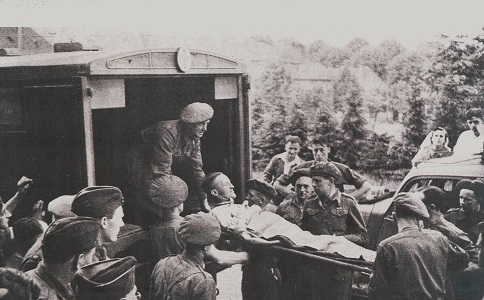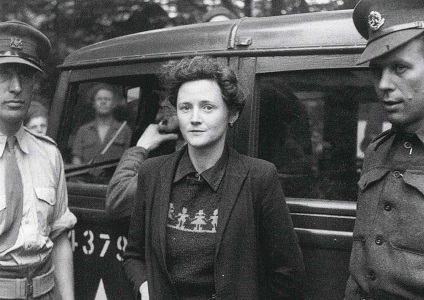“YOU WOULDN’T HAPPEN TO BE WILLIAM JOYCE, WOULD YOU?”

by Tom Kenny
William Joyce was born in Herkimer Street, Brooklyn, New York in 1906 to Gertrude (who was originally from Lancashire) and Michael Joyce, a native of Killour, Co. Mayo. Michael had taken American citizenship, which automatically made his family citizens. In 1909, the family returned to Ireland, initially to Mayo, then to Galway.
They lived at Ruttledge Terrace in Salthill. William attended the Mercy National School and later the Jes, where ‘the staff and the students were rough’. But he was always grateful for the sense of discipline and a love of language they instilled in him. His best subjects were Latin, French, German and English poetry. He enjoyed the rough and tumble of the playground and had his nose broken in a fight which left him with a nasal tone of voice. He was a bombast, precocious and a gang leader.
His father was a Catholic, his mother Protestant. He asked his divinity teacher if his mother was damned for eternity because of this and when told she was, he said “If my mother is going to hell, then I am going with her” and so he rejected Catholic doctrine. He soon found an alternative to religion in politics. His father was a loyalist and for William, “Patriotism is the highest virtue that I know”. He involved himself with the Black and Tans and was often seen accompanying them in their Crossley tenders. There were rumours of him being connected to the murder of father Griffin so when the truce came, he had to leave the country.
He went to Britain and eventually became involved in politics, especially in the fascist movement. He was a great admirer of Hitler and eventually, the authorities decided to arrest him. On that very day, he and his second wife, Margaret, boarded a ship on their way to Berlin. He was quickly given a job by Goebbels and soon found himself broadcasting German propaganda on radio. ‘Gairmany calling, Gairmany calling’ was how he introduced each programme in his nasal voice. He was very well informed, an outstanding broadcaster who attracted a huge audience, especially in this country and in Britain. There, they lampooned him by calling him “Lord Haw-Haw”, but this merely added to his mystique and his fame. At the end of the war, he disappeared from view.

On May 28th, 1945, two British Army officers drove into a forest on the Danish-German border to collect kindling for their stove. They met a weary, underfed man who limped towards them and there was a brief conversation. One of the officers recognised the most famous voice of the war and said “You wouldn’t be William Joyce, would you?”. The man delved into his pocket and one of the officers, thinking he was reaching for a gun, shot him in the buttock. As the man fell to the ground, clutching his backside, he moaned and said ‘My name is Hansen’ and produced a Reisepass and said ‘I am not armed’. They searched him for arms and found a Wehrpass which showed he was a member of the German Home Guard and his name was William Joyce.
Later, a Lieutenant supported by ten soldiers, two Bren carriers and a lorry, turned up at the house where Joyce and his second wife, Margaret, were staying. They asked if she was Mrs. Joyce and she bowed by way of an answer. “We’ve been expecting this for weeks, we mustn’t make a fuss of it now”. She was placed in a cell where a parade of soldiers came to look at her. A chaplain asked if she was married and she said that unless he put his questions in a more becoming manner, she would refuse to answer. When she requested a glass of water, a major said it should be laced with typhus like the water given to the inmates in Belsen. She simply said “Don’t you mean Typhoid? ”. He called her a bitch and threatened to knock her block off and she said “I don’t mind if you hate me so long as you do it politely”. While she was in the guard house, soldiers emerged carrying Joyce on a stretcher, it was the last they were to see of each other for six months.
They were taken back to England. There, the authorities knew that William was an American citizen and as such, could not be tried for treason. But they wanted him executed and built up a case against him, a case many felt was ‘a blot on the British justice system’ and he was executed. Margaret was never prosecuted.
He wrote to her every day. In one of his last letters, he wrote “I am anxious that you should go to Galway and see the docks, Long Walk, the Spanish Arch, O’Brien’s Bridge, Nile Lodge, Taylor’s Hill, Lenaboy Castle and Menlo and the Corrib, but above all, the stretch from Salthill to Blackrock—the promenade with Rockbarton where we used to live behind., where I romped in my boyhood, first gaining that glimpse, mysteriously of this infinite which is now so dear to me in these last days. It has been my cherished dream to take you to these places myself but I can still walk with you in spirit there”.
In 1976, Joyce’s daughter, Mrs. Heather Iandolo had his remains brought back to Galway and he is interred in the new cemetery. Our photographs show Joyce arriving at Army Headquarters just after his capture, and his wife Margaret after hers.
